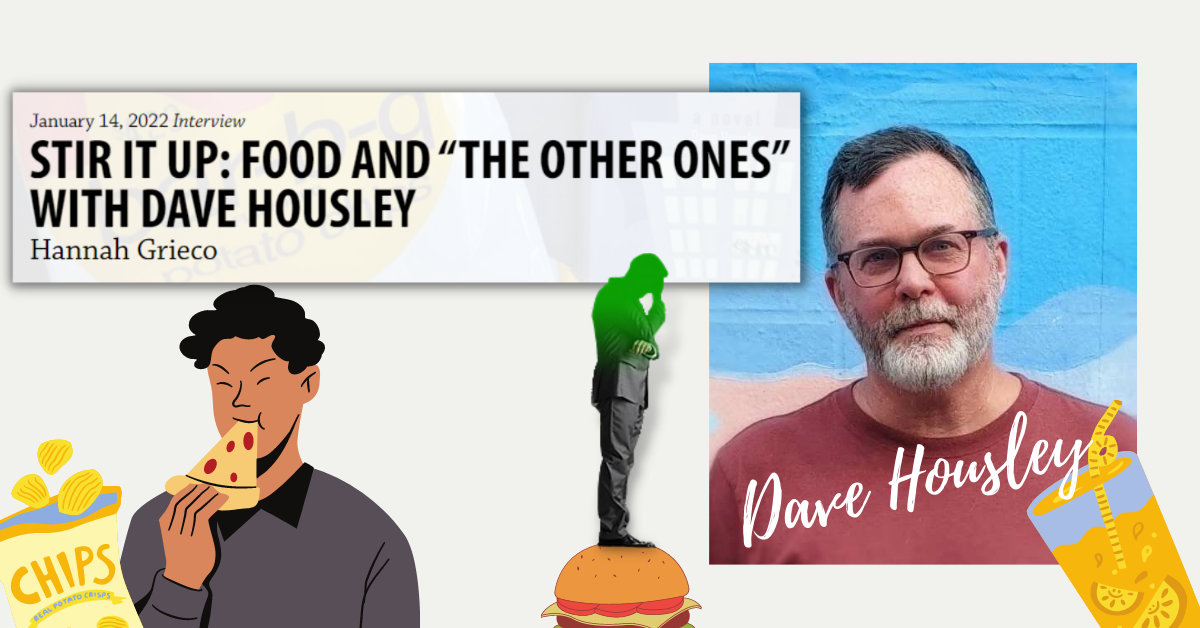Dave Housley Talks Craft and Kraft with Hobart Lit Journal
The Other Ones author sits down with ASP's own Hannah Grieco (for Hobart) to discuss some of the food-based inspiration for his new novel

In a new interview with Hobart Literary Journal, Dave Housley breaks down the role of food in his new darkly comedic office novel The Other Ones. In a section of extended metaphor, Housley describes TOO as if it were a recipe, and in another section assigns a snack to each of the characters in the office. The interview is conducted by ASP's own Hannah Grieco. Read the full interview HERE. An excerpt follows:
Okay, tell us about your book!
It’s a novel about a group of people whose co-workers win the lottery. The book follows the people who do not win the lottery over the course of the next year as they shoot off in various (mostly bad) directions. It’s told in short chapters from seven different point of view, including a rather incompetent ghost of a man who jumps off the building in the first chapter and then comes back to haunt the lottery winners. I think it’s dark and also funny and nearly every thing that’s annoyed me over thirty some years of working in offices found its way in there as well. I was really happy that Matt Bell called it a “bighearted office comedy” because that’s really what I was going for.
If The Other Ones was a metaphoric recipe, what would the ingredients be?
I love chili, and one thing I love about it is the mix of flavors – you’ve got hot and also sweet, a base and some flavors kind of dancing around at the edges, all of these ingredients eventually combining to make one cohesive thing. I think all of those things could generally be said about this book: it’s a little dark and hopefully a little funny. It's character driven literary fiction but also very much driven by plot, and part of that plot involves two people who buy guns. It’s realistic but there’s a fair amount of mystery and one of the characters is a ghost. So yeah, I think this book is one of those chilis where you run out of a few things and have had one too many chili-making beers to get back to the grocery store so you improvise.
Small Press Week 2018: Monday, a look back at the Inception of ASP
We’d been talking about founding a press for a few years. I was becoming increasingly frustrated and angry about what was happening to some of the books I’d edited, and to some of my writer friends. Some of the books I worked on already had committed publishers, who knew my work and wanted me involved, and that’s great. But sometimes I was hired by a writer who had a publisher but knew they were not going to give the book a thorough edit – there is less and less of that going on these days, as you can see from opening even a big-name title. And I think — we think — that that is awful. If you are published by ASP, you get a thorough and very fine edit…
Featured Audio: “The Lovesick Lake,” a Story by James J Patterson
“Lovers of the personal essay should be rejoicing in the streets at word of this collection. For readers and acquaintances of Jimmy Patterson, it is long overdue, but the author was born in Washington, D.C., where the machinery of progress is congenitally slow. So this book, in many important ways – is what all satisfying collections of autobiographical essays should be – a mirror of place.” Rick Walter
Armistice Day, known in the US as Veteran’s Day, is now a work week past, but for James J Patterson it is a memory and idea that refuses to restrain itself to a 24 hour period. Yesterday we published his moving account of those veterans of The Great War he knew growing up, memorializing and contextualizing them for an audience whose experience of the war may only be through the muddy, pained faces in old photographs…
The World of Yesterday (Armistice Day, 2018)
My father always said that his first memory was of standing on the couch in his parent’s living room, small hands on the back cushion, peering out a picture widow at a neighborhood street in Bend, Oregon. There is a slow-moving line of cars and horse-drawn carriages inching its way down the lane. The line of cars is there every day, and every day he stands there and watches. His street is a long one and at the end of it is the cemetery. He is not allowed to go outside to play. Death is all anyone talks about. Death from a great flu epidemic. Death from a great war just ending. Everyone has lost someone. Most have lost a few. It is 1918…